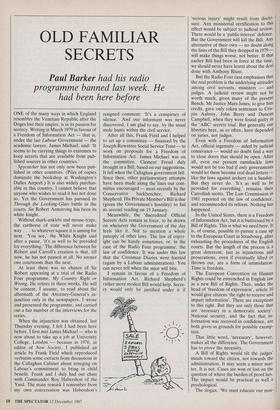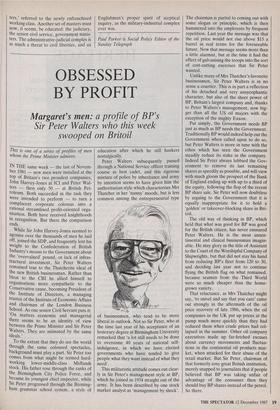OLD FAMILIAR SECRETS
Paul Barker had his radio
programme banned last week. He had been here before
ONE of the many ways in which England resembles the Venetian Republic after the Doges lost their empire, is in its passion for secrecy. Writing in March 1979 in favour of a Freedom of Information Act — that is, under the last Labour Government — the academic lawyer, James Michael, said: 'It seems to be carrying things to extremes to keep secrets that are available from pub- lished sources in other countries.'
Spycatcher has not only now been pub- lished in other countries. (Piles of copies dominate the bookshop at Washington's Dulles Airport.) It is also widely purchas- able in this country. I cannot believe that anyone who wishes to read it has not done so. Yet the Government has pursued its Through the Looking-Glass battle in the courts. Sir Robert Armstrong has been its white knight.
Without shark-anklets and mouse-traps, the carthorse of state will never make way . . . to whatever square it is aiming for next. 'You see,' the White Knight said after a pause, 'it's as well to be provided for everything.' The difference between Sir Robert and Carroll's creation is that, till now, he has not paused at all. No sooner one courtroom than the next.
At least there was no chance of Sir Robert appearing at a trial of the Radio Four programme, My Country Right or Wrong. He retires in three weeks. He will be content, I assume, to read about the aftermath of the Attorney-General's in- junction only in the newspapers. I wrote and presented the programme, and carried out a fair number of the interviews for the series.
When the injunction was obtained, last Thursday evening, I felt I had been here before. I first met James Michael — who is now about to take up a job at University College, London — because in 1976, as editor of New Society, I published an article by Frank Field which reproduced verbatim some extracts from discussions in the Callaghan Cabinet about reneging on Labour's commitment to bring in child benefit. Frank and I duly had our chats with Commander Roy Habershon of the Yard. The main remark I remember from my own conversation was Habershon's resigned comment: 'It's a conspiracy of silence.' And our informant was never discovered, I am glad to say, by the usual mole hunts within the civil service.
After all this, Frank Field and I helped to set up a committee — financed by the Joseph Rowntree Social Service Trust — to work on proposals for a Freedom of Information Act. James Michael was on the committee. Clement Freud duly brought in a Bill, based on our suggestions. It fell when the Callaghan government fell. Since then, other parliamentary attempts have been made along the lines our com- mittee encouraged — most recently by the Conservative backbencher, Richard Shepherd. His Private Member's Bill is due (given the Government's hostility) to fail its second reading on 15 January.
Meanwhile, the 'discredited' Official Secrets Acts remain in force, to be drawn on whenever the Government of the day feels like it. Not to mention a whole panoply of other laws. The law of copyr- ight can be handy sometimes, or, in the case of the Radio Four programme, the law of confidence. It was under this law that the Crossman Diaries were harried (again by a Labour administration). You can never tell when the mice will bite.
I remain in favour of a Freedom of Information Act. Richard Shepherd's rather more modest Bill would help. Secre- cy would only be justified under it if `serious injury' might result from disclo- sure. Any ministerial certification to this effect would be subject to judicial review. There would be a 'public interest' defence. But the Government will kill the Bill. Any alternative of their own — no doubt along the lines of the Bill they dropped in 1979 — will make things worse, not better. If that earlier Bill had been in force at the time, we should never have learnt about the deal done with Anthony Blunt.
But the Radio Four case emphasises that the real problem is the underlying attitudes among civil servants, ministers — and judges. A judicial review might not be worth much, given many of the present Bench. Mr Justice Mars-Jones, to give him credit, gave only token sentences to Cris- pin Aubrey, John Berry and Duncan Campbell, when they were found guilty in the 'ABC' secrets trial. But generally our liberties here, as so often, have depended on juries, not judges.
Even with a Freedom of Information Act, official ingenuity — aided by judicial connivance — would no doubt find a way to close doors that should be open. After all, even our present ramshackle laws would not be too bad if only governments would let them become real dead letters like the laws against archery on a Sunday. But they never do. 'It's as well to be provided for everything,' remains their Carrollish motto. The Law Commission in 1981 reported on the law of confidence, and recommended its reform. Nothing has happened.
In the United States, there is a Freedom of Information Act, but it is buttressed by a Bill of Rights. This is what we need here. It is, of course, possible to pursue a case up to the European Court in Strasbourg, after exhausting the procedures of the English courts. But the length of the process is a great deterrent, just as injunctions and prosecutions, even if eventually lifted or thrown out, are a form of intimidation. Time is freedom.
The European Convention on Human Rights could be entrenched in English law as a new Bill of Rights. Then, under the head of 'freedom of expression', article 10 would give citizens 'the right to receive and impart information'. There are exceptions to this right. But they are only those that are 'necessary in a democratic society'. National security, and the fact that in- formation was received in confidence, are both given as grounds for possible exemp- tion.
That little word, 'necessary', however, makes all the difference. The Government has to prove the necessity.
A Bill of Rights would tilt the judges' minds toward the citizen, not towards the administration. It may seem a minor mat- ter. It is not. Cases are won or lost on the question of where the burden of proof lies. The impact would be practical as well a psychological.
The slogan, 'We must educate our mas- tern,'. referred to the newly enfranchised working class. Another set of masters must now, it seems, be educated: the judiciary, the senior civil service, government minis- ters. The administrative-judicial complex is as much a threat to civil liberties, and an Englishman's proper spirit of sceptical inquiry, as the military-industrial complex ever was.
Paul Parker is Social Policy Editor of the Sunday Telegraph



























































 Previous page
Previous page